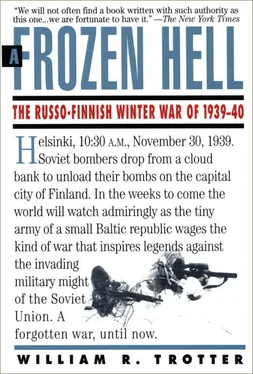The Karelian Isthmus: Round One
There were ten separate campaigns developing in the early days of December, from one end of Finland to the other. To try to describe all of them in strict chronological order—recounting events on each front day by day—would be to create a most unwieldy and confusing narrative. Therefore, whereas the reader should bear in mind that all of these battles were evolving simultaneously, some sort of arbitrary order must be imposed for the sake of clarity. Since the threat to Finland was most critical on the Karelian Isthmus, and since the military operations there in December form a coherent narrative unit, that theater will be examined first. Subsequent chapters will work northward from Fourth Corps’s zone to the Arctic.
General Meretskov stormed across the Isthmus frontier with 120,000 men, 1,000 tanks, and the supporting fire of about 600 guns. Before the border area could be turned into a combat zone, however, the Finns had to move the civilians out. During the interval between the collapse of the Moscow negotiations and the start of hostilities, thousands of Karelian families were evacuated. The Finnish border troops who organized this exodus were deeply moved by the toughness and patriotism of the farming families they dealt with. They were simple people, few of them educated, and they lived poor, marginal lives close to the earth. But they had sisu in abundance.
In one village, a detachment of border guards came up to the home of an aged peasant woman and sadly informed her that she must prepare to leave her home, possibly forever, with only the belongings she could carry on her back and in the horse-drawn sled tethered near her cabin. In the morning, they would return and burn her house to the ground, so that the Russians could not sleep there. When the soldiers returned the next morning, they found the sled parked by the old woman’s door, piled high with her possessions. When they entered the farmhouse, they were startled to see that the entire dwelling had been scrubbed and whitewashed until it sparkled. Stuck to the wall by the door, the woman had left a note saying that she had gone to fetch something at a neighbor’s house and would return in time to drive the sled away in the soldiers’ company. In the meantime, the note concluded, if the soldiers would look by the stove, they would find enough matches, kindling, and petrol to burn the house quickly and efficiently. When the old woman returned, the soldiers asked her why she had gone to so much trouble. Pulling herself upright with all the dignity she could summon, she looked them in the eye and replied: “When one gives a gift to Finland, one desires that it should be like new.” [1] Langdon-Davies, 126.
In another border village, covering troops roused an old farmer from his sleep—a gentleman who had refused earlier evacuation—and informed him that there would probably be fighting here by morning. They had come to burn his house tonight, they said, because when the battle started, they would be too busy. Grumbling, the old peasant gathered his few personal belongings, hitched up his horse, and rode eastward. Later the next morning, even as the first sounds of skirmishing could be heard in the distance, the same Finnish border troops were astonished to discover that the old man had returned and was wandering amid the ruins of his former house, prodding the ashes with a tree branch and muttering to himself in the thick dialect of the Karelian Finns. Several soldiers went over to the old fellow and asked him what he was doing back here, especially with the fighting now in earshot. The farmer’s gnarled features twisted into a grim smile and he said: “This farm was burned down twice before on account of the goddamned Russians—once by my grandfather, and once by my father. I don’t reckon it’ll kill me to do it either, but I’ll be damned if I could drive away without first making sure you’d done a proper job of it.”
The abandoned villages were not hospitable even in ruins. Booby traps had been placed with such cunning and imagination that Pravda was moved to complain about the Finns’ “barbaric and filthy tricks.” Everything that moved seemed attached to a detonator; mines were left in haystacks, under outhouse seats, attached to cupboard doors and kitchen utensils, underneath dead chickens and abandoned sleds. The village wells were poisoned, or, if time and chemicals were lacking, fouled with horse manure. Liberal use was made of cheap pipe mines—steel tubes crammed with explosives, buried in snowdrifts and set off by trip wires; the charge went off at waist level and caused very nasty wounds. A colonel named Saloranta invented a type of wooden mine, impossible to detect with electronic devices, that was powerful enough to blow the treads off a tank. Soon the Russians had to detach patrols to clear the roads with sharp prods before the tanks could advance.
Under the newly frozen lakes, mines were strung on pull ropes; only partly filled with explosives so they would retain buoyancy for several days, the charges were not designed to blow up the tanks but rather to shatter the ice beneath them. When word got around about this tactic, the Russian tank drivers began to avoid the lakes altogether, which was precisely what the Finns wanted, since it was much easier to ambush the vehicles in the countryside than out on the lakes, where their guns could sweep the terrain all around. At several locations the Finns unrolled enormous sheets of cellophane over frozen lakes so that, from the air, they would look unfrozen, and the enemy would not even bother trying to cross them.
Almost from the opening minute of the war, traffic began to back up on the Russian side. Mechanized columns were jammed bumper to bumper, with vehicles slewing off the roads into the morass of snow, weeds, and half-frozen bogs on either side. Sporadic but heavy snowstorms lashed the advancing columns, immobilizing some and slowing others to a crawl. And even a token show of Finnish resistance caused delay and confusion far out of proportion to the size of the force doing the resisting.
Between the frontier and the Mannerheim Line was a buffer zone between twelve and thirty miles deep. In this border area, Mannerheim had deployed about 21,000 men, organized into four “covering groups.” Each was designated by a letter of the alphabet corresponding to its commander’s name. Under control of Second Corps (Öhquist), were Groups U, M, and L; under control of Third Corps (Heinrichs) was the northernmost covering force, Group R. Strategic command of the overall Isthmus battle was under command of Mannerheim’s chief of staff, a tough-minded, intelligent general named Hugo Östermann. The general line along which the covering troops were positioned ran through a string of small Karelian villages: Uusikirkko, Kivinapa, Lipola, Kiviniemi. A large part of the First Division was held in reserve between the covering troops and the line, between Lakes Suulajärvi and Valkjärvi. Mannerheim wanted to disrupt and pin down at least one large Russian formation out in the open and then bring up the First Division to attack it, but things didn’t work out that way, and most of the division appears to have been withdrawn back into the line before it saw much action.
General Östermann had always thought the plan too ambitious for untried troops. More than Mannerheim, he seems to have appreciated the fact that the “wild card” in this strategy was the Russians’ tanks and the effect they might have on troops who had never faced armor before, even in training. Östermann had envisioned a strictly delaying role for the covering troops, while the Mannerheim Line was being manned. Of course, as it turned out, the line already was manned when the war began. Since this was the case, Östermann felt it was folly to risk good troops in front of good defensive positions rather than behind them. The net result of this command uncertainty was furious resistance at some places, token displays at others, and a spotty effort rather than a concerted defensive strategy in the buffer zone as a whole.
Читать дальше












